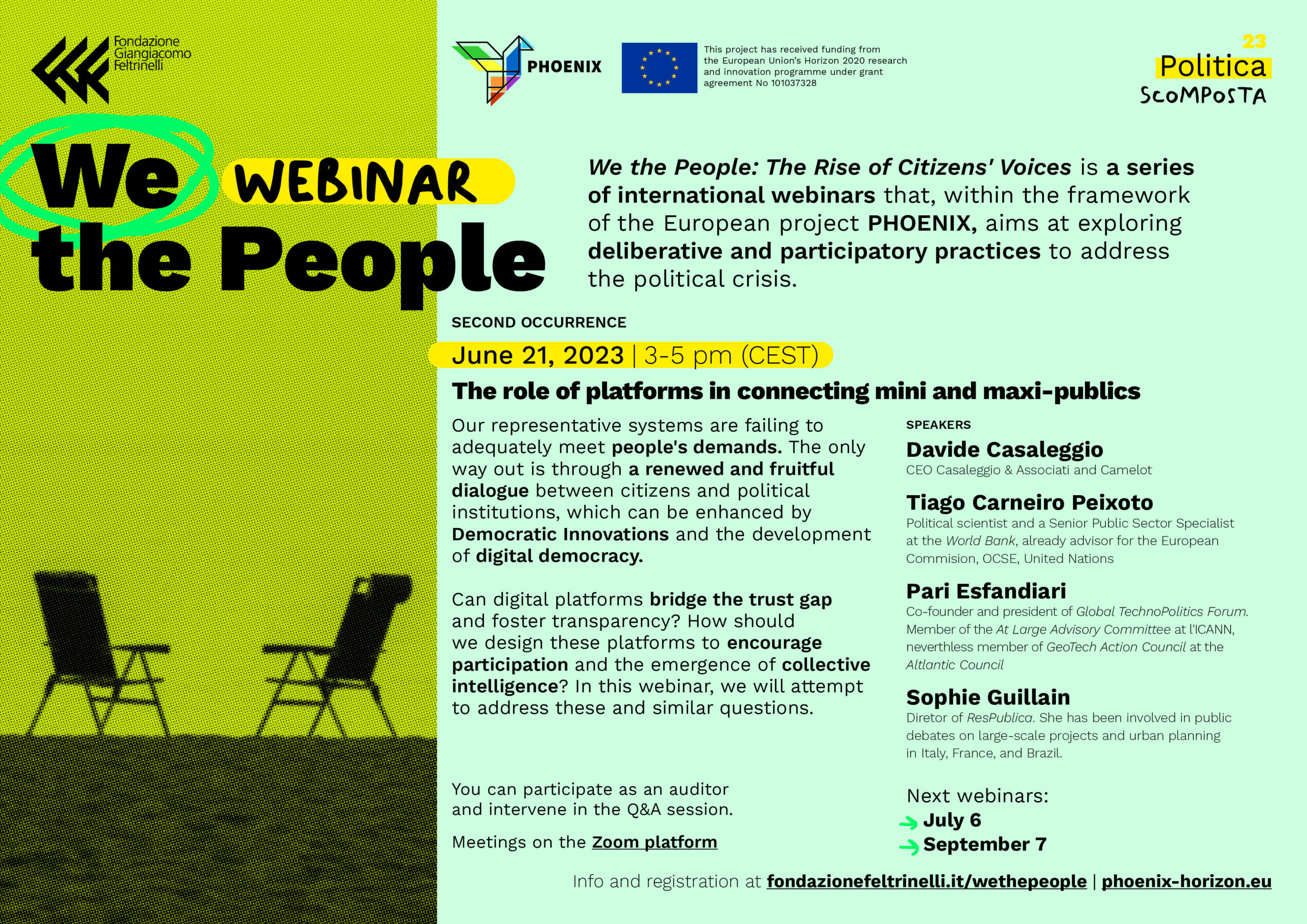21 June 2023 | 3-5 pm (CEST)

The Role of Platforms in Connecting Mini and Maxi Public
Our representative systems are failing to adequately meet people’s demands. The only way out is through a renewed and fruitful dialogue between citizens and political institutions, which can be enhanced by Democratic Innovations and the development of digital democracy.
Can digital platforms bridge the trust gap and foster transparency? How should we design these platforms to encourage participation and the emergence of collective intelligence? In this webinar, we will attempt to address these and similar questions.
Main speakers
Davide Casaleggio, CEO Casaleggio & Associati and Camelot
Tiago Carneiro Peixoto, Political scientist and a Senior Public Sector Specialist at the World Bank
Pari Esfandiari, Co-founder and president of Global TechnoPolitics Forum
Sophie Guillain, Director of Res publica
Roundtable participants
Stefano Sotgiu, Prossima Democrazia
Silvio Icka, Sciences Po
Alessandra Cardaci, Debating Europe
Emilien Paulis, University of Luxembourg
Victoria Solé Delgado, Scuola normale Superiore
Enrico Biale, Università degli Studi del Piemonte Orientale
Simone Marsilio, Università Vita-salute San Raffaele
Agenda
15.00 – 15.05 Welcome greetings | Ludovica Taurisano on behalf of Fondazione Feltrinelli
15.05 – 15.10 Introduction | Giovanni Allegretti
15.10 – 15.15 Overview of the webinar | Sophie Guillain
15.15 – 15.30 Speech | Tiago Peixoto
15.30 – 15.45 Speech | Pari Esfandiari
15.45 – 16.00 Speech | Davide Casaleggio
16.00 – 16.10 Comments | Sophie GuillaIn
16.10 – 16.15 Break
16.15 – 16.45 Roundtable and debate
16.45 – 16.55 Q&A from auditors
16.55 – 17.00 Final remarks
Links:
About "We the People. The Rise of Citizens’ Voices"
Is it a crisis of democracy, or rather a crisis of participation within democracies, that we are facing? What factors contribute to the growing tendency to limit citizens’ involvement in the electoral process?
The issue of the complex, yet virtuous, relationship between information, liberal democracy, and the market economy has been extensively researched and analyzed. Recent high-tech innovations have posed significant challenges as they occurred amid geopolitical transformations, such as the end of the bipolar world, the European Union’s rapid expansion, and the collapse of the social prestige of the intermediate bodies. These changes have occurred alongside dramatic globalization, the rise of neoliberalism, and a prevailing culture of narcissism and individualization.
As a result, we find ourselves in a representative system that fails to adequately address people’s demands. The only way out of this democratic deficit is a renewed and fruitful dialogue between the public and institutional spaces. How can we reconnect citizens with administrative representatives? How can we overcome the top-down technocratic management and ensure that citizens’ voices actually contribute to policy co-creation? To answer these crucial questions, we must explore the trends of Democratic Innovations (DIs) and the potential benefits of the improvement of digital democracy.
Deliberative and participatory democracy becomes even more vital if we aim at pursuing the green transition, as any transformative process requires broader support to be efficient. Moreover, we cannot achieve an equal, just, and sustainable Green Deal unless we acknowledge the interests of those who will mostly be impacted by decision-making.
On the other hand, a technocratic approach will result in backlash, as there is no flawless and encompassing solution that can be posed to the climate crisis and get a unanimous consensus. What matters, instead, is that throughout the process, people’s needs are duly considered, debated, and represented.
This is the driving force that inspires the work of the PHOENIX Project: to gather civil society, stakeholders, practitioners, and anyone capable of contributing valuable discourse while advocating for the interests of the least represented and advantaged individuals in society.
The purpose of this series of webinars is to empower participants to become acquainted with the latest trends in Democratic Innovations while investigating the potential and the obstacles facing participatory and deliberative democracy. Following each workshop, we will contemplate how to foster participation beyond the local level and include the interests of minorities by placing them in the context of larger citizen groups. We will reflect on the conditions for thriving participatory processes based on mutual trust and respect, and whether such democratic experiments can actually reduce the gap between participation and representation.
Next webinars
6th July The hard life of a facilitator: deliberating on complex issues
7th September How to perform your interests during deliberation. Democracy beyond the exit strategies

Follow us on: